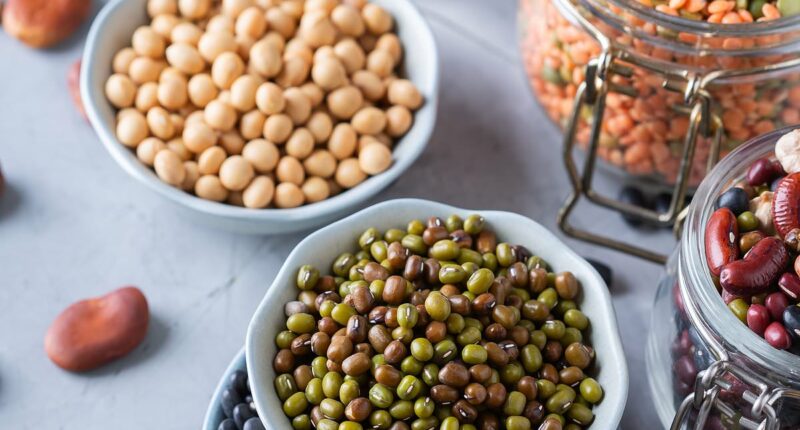Share this @internewscast.com
Swapping out just one weekly serving of red or processed meat for beans or pulses may significantly reduce the risk of developing gallbladder cancer, a new study suggests.
Health advocates and officials have long cautioned against diets rich in red and processed meats, citing their potential harm to overall health.
Processed meats, including bacon, are known to produce nitrates in the body, which have been associated with a range of chronic health issues, such as high blood pressure, kidney disease, and even bowel cancer.
While some experts recommend eliminating processed meats entirely, the latest research indicates that simply replacing one portion of red or processed meat per week with legumes could substantially decrease the likelihood of gallbladder disease.
Recent reports from Cancer Research UK reveal that gallbladder cancer cases have doubled among individuals aged 24 to 49 over the last 30 years, a concerning trend in those under 50.
The exact cause behind this alarming rise remains unclear, though oncologists suspect that dietary habits, particularly those of women who have had children, might play a significant role.
Specifically, experts believe the answer may lie within subtle changes to the trillions of bacteria in our gut—the microbiome—as a result of diets heavy in ultra-processed foods.
Professor Daniel Ibsen, an expert in nutrition and cardiometabolic disease and study lead author, said: ‘While our study did not directly address the underlying mechanisms, the lower gallbladder disease rate observed when legumes replaced red and processed meat suggests the legume fibre may play a role.’

Data from charity Cancer Research UK show an 84 per cent rise in cases of gallbladder cancer in Brits aged 24-49 since the early 90s. Image of the human digestive system of which the gallbladder is a part

The researchers concluded that swapping just one portion of red and processed meat with legumes a week could slash gallbladder disease risk, mainly in women
The gallbladder is an apple-sized organ located near the liver and is primarily responsible for storing bile, a substance used by the body to break down the fats we eat. The risk of gallbladder cancer is around five times higher in people with a history of gallbladder conditions, such as gallstones, according to Cancer Research UK.
In the current study, published in the European Journal of Nutrition, Danish researchers sought to examine whether replacing red and processed meat, poultry or fish with legumes—such as lentils, peas, or beans—could influence gallbladder disease risk.
The researchers analysed the health records and dietary patterns of 121,593 participants from the UK Biobank, aged around 57-years-old.
At the start of the study, participants completed questionnaires about their diet, health-related characteristics and sociodemographic.
Healthcare professionals then took their biomedical statistics, including age, height weight, sex and body mass index (BMI) .
An online 24-hour dietary questionnaire was then used to assess participants’ diets, comprised of 206 different food items and 32 drinks selected using UK National Diet and Nutrition Survey data to reflect the most commonly consumed items in the UK.
Over half of participants reported no legume consumption, whilst those with the highest legume intake ate significantly less animal based foods such as red and processed meats, poultry and fish.
During a 10.5 year follow up, 3,772 individuals went on to develop gallbladder disease which was linked with a higher intake of red and processed meats.

The NHS recommends no more than 70g of processed meat per day — roughly two thick rashers of bacon, one and a half sausages or just a third of an 8oz steak
The researchers noted that those who went on to develop gallbladder disease had a higher BMI, were more likely to smoke, have reported a recent weight loss and have used hormone replacement therapy (HRT) drugs or oral contraceptives.
Replacing just under one portion of red of processed meat a week, or around 80g, was associated with a three per cent lower risk of gallbladder disease. Interestingly no such association was found when replacing poultry or fish with legumes.
This remained true even when potentially confounding variables, like BMI, were accounted for.
One reason for this, the researchers suggested, could be that eating legumes increases the amount of fibre-degrading bacteria in the gut which may in turn improve the gut function.
A 2023 study found that patients with biliary tract cancers, of which gallbladder cancer is one, had lower levels of good bacteria, such as clostridia, and increased levels of harmful bacteria in the gut.
This beneficial bacteria is naturally occurring in vegetables, while high-fibre legumes such as nuts and pulses will also nurture the microbiome.
However, the researchers also noted that the effect could be driven by the cholesterol-lowering effect of legumes, or lower saturated fat intake as a result of consuming less red and processed meats.
Legumes such as beans and pulses tend to be high in fibre—some of which is soluble—slowing down the absorption of sugar into the bloodstream.
Soluble fibre acts like a sponge in the gut, binding with cholesterol-rich bile in the digestive system, and helping the body eliminate it before it can be absorbed by the bloodstream.
According to the NHS, people who are obese or eat a diet that’s high in fat and low in fibre, or have lost weight quickly through weight loss drugs—but may still have high cholesterol—are at higher risk of developing gallstones, which are a major risk factor for gallbladder cancer.
Most notably, a 2015 study from the World Health organisation (WHO) found that every daily portion of processed meat raises colorectal cancer risk by 18 per cent—though the same link was not found with gallbladder cancer.
However, the researchers acknowledged that the study had some limitations, including the use of self-reported dietary questionnaires and the fact that they couldn’t explain the lack of association among men.
And unfortunately, gallbladder cancer is considered a largely silent disease, with symptoms only becoming apparent in its later stages.
These can include jaundice — the skin and eyes turning a yellow shade — abdominal pain, itchy skin, unexplained weight loss, nausea, vomiting and changes in the colour of urine and faeces.
It is often detected only by chance during operations, for example to remove gallstones, and if its found in its early stages where its contained to the organ, the five year survival rate is around 60 to 70 per cent.
But if the cancer has spread to surrounding tissues or lymph nodes, the prognosis is much bleaker.
Only about a sixth of gallbladder cancer patients are expected live 10 years after their diagnosis. If possible, treatment involves surgery along with chemotherapy.











